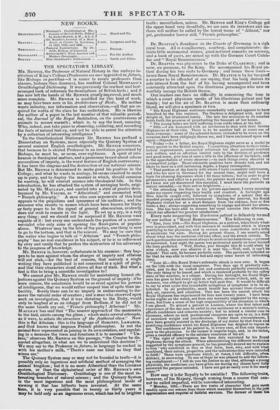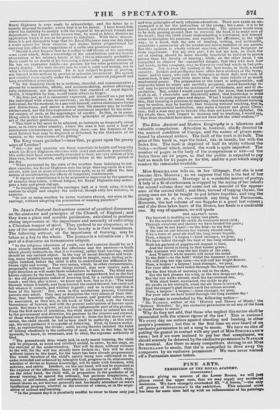Dr. BEATTIE'S Residence in the Courts of Germany is a
righ royal tour. All is comiilacency, courtesy, and compliments : de- licate little sentimental stories, good-natured remarks on scenery, and a book of posts, are mixed up with the German Court Calen- dar and " Royal Reminiscences."
Dr. BEATTIE was physician to the Duke of CLARENCE ; and is now, we presume, to the King. He accompanied his Royal pa- tient during his two visits to Germany ; and hence these tours--"- hence these Royal Reminiscences. Dr. BEATTIE is by far too good a courtier to be offended at our saying, that his book derives its sole interest from the fact of his having accompanied and been constantly attendant upon the illustrious personages who now so worthily occupy the British throne. Our readers can have no difficulty in conceiving the tone in which a court physician speaks of his illustrious patient and his family ; but as the air of Dr. BEATTIE is more than ordinarily bland, we will give a specimen or two.
" His Royal Highness continues remarkably well, and appears to have benefited by the late regimen. The Duchess is delighted with, and the delight of, her illustrious family. The late fair accession to its number holds forth the promise of perpetuating the honours of her house.
" The young ladies are both suffering from colds taken at the ball. " 30th.—I am honoured with an invitation to dine with their Serene Highnesses at their villa. There is to be another ball at court one of these evenings : some of the splendid dresses intended to be worn on the occasion have been obligingly shown me, and I have exclaimed again and again—Magnificent ! " Friday—As a father, his Royal Highness might serve as a model to every parent in the British empire. Unremitting attention to their intel- lectual improvement, unwearied solicitude for their personal comfort and welfare, and an affection limited only by the dictates of -prudence and good sense, give him at once a title to the affection of his family, and to the approbation of every observer ;—in such things every observer is a competent judge. Those estimable qualities have already had, and are likely to have in a still increasing degree, a happy recompense.
" That portion of the family with whom I have immediate intercourse, and who are now in Germany for the second time, might well form a topic for pleasing digression while I fill these tablets; but in order to give permanency and effect to a picture, the painter must employ shade ; but as I have not yet discovered this essential, I must leave the portraits as nature intended,—in their native brightness. . . .
" On attending the Duke in his private apartment, I every morning make my report respecting their health and comfort. A fortnight ago Miss Ameaa caught cold, followed by symptoms of a nature that de- manded prompt and decisive treatment. During the interval, his Royal Highness visited her at a short distance from the chiteau, four or five times a day ; always suggesting something to engage and divert her atten- tion. She has been able to resume her usual exercise this afternoon, which has afforded the greatest satisfaction."
Every note respecting his illustrious patient is delicately termed by our author a "Royal Reminiscence." The following is one. Ems, June 16th.—Ilis Royal Highness, as a patient, takes freely what- ever is prescribed, and with that measure of confidence which is always gratifying to the physician, and in certain cases contributes not a little to accelerate the cure. During his present illness, I am usually asked about what hour the medicine will take effect, and the attack subside. To such questionsthe answer must always be more or less hazardous,—yet must be answered. Last night the spasm was protracted nearly an hour beyond the time predicted. Well, Doctor, you thought this fit would abate by nine o'clock, now you observe it is near ten.—Well, well, it can't be helped.' This said, he became perfectly calm. The paroxysm subsided so
sleep. "Junehe was able to retire to bed and enjoy some hours of refreshing " June 25.—His Royal Duke's asthmatic attack is now over. It began on the 12th with the usual symptoms. Two days ago it gradually sub.. sided, and to-day he walked out and continues perfectly convalescent. The only thing to be feared, and which is rendered probable by the sultry state of the weather, is a relapse. During the fortnight, his Royal High- ness has gone to bed every night at, or-before, eleven o'clock, and, in no instance, was obliged to get up before half-past five. It would be difficult to say to what cause this remarkable mitigation of symptoms is to he at. tributed. In all probability, much benefit has accrued from change of diet, air, exercise, and situation. This has been the easiest attack his Royal Highness has experienced for four-and-twenty years. I have been seven nights on the watch, not from any necessity suggested by the symp- toms, but from a sense of the high responsibility of the situation in which I am placed. To attend a patient in London, where the first talent and experience of the day may be called to our assistance at a minute's notice, affords confidence and removes anxiety ; but to attend a similar case in Germany, where no such professional resources are open to us, is a duty of increased weight and consideration. Under these circumstances, have been greatly assisted in the discharge of my duties by that frank and gratifying confidence which his Royal Highness has deigned to repose in me. The confidence of his patient is, in every case, of first-rate import. ance to the physician. In the former it inspires hope, and, in the latter, gives a twofold efficacy to the salutary resources of his art.
"The right of interrogation has been duly exercised by his Royal Highness during the attack. When administering the different medicines suggested by the symptoms present, he has generally desired me to explain to him why exhibited in this or that form, how, why, and with what combined, their nature, properties, and the indications they were intended to fulfil.' These were questions which, at times, I telt difficulty, often delicacy, in answering. To one of them he was pleased to add the follow'- tog compliment:—' I will do you the justice to say that, although a young physician, the medicines you have given me during my illness have fully answered the purpose intended. I have not got so easily over it for many years." How easy it is for Royalty to be amiable! The following trait; however, of his Majesty, though coming from a source that can- not be called impartial, will be considered interesting. "Monday, 10th.—There are few traits of character -that gain mare readily upon our esteem than those which manifest themselves in th,e just appreciation and requital of faithful services. The -former of these hilt Royal Highness is ever ready to acknowledge, and the latter he ii equally disposed to confer, where that is in his power. I have heard him regret his inability to comply with the request of his private friends and dependents ; but I have never known him, by word or letter, dismiss an application which it was in his Flower to entertain. With these disposi- tions it is not disloyal to hope that his Royal Highness may one day enjoy a wider sphere for their exercise, and means better proportioned for carrying into effect the suggestions of a noble and generous nature.
"Should it ever happen that he is called to thE throne of his ancestors —an event which, from a knowledge of his constitution, and the hourly observation of his salutary habits of life, I think extremely probable— there could be no doubt of his becoming a deservedly popular monarch. He has no expensive habits—no passion for the mere gratification of empty display. His taste directs him to what is solid and lasting, not to what is frivolous or ephemeral. He is not subject to gusts of passion, nor biassed in his actions by peevish or splenetic resentment. His speech and conduct seem equally under the influence of matured judgment and long established principles. " In his domestic circle he is uniform, cheerful, and communicative ; abroad he is accessible, affable, and accommodating, neither affecting a lofty demeanour, nor descending below that standard of royal dignity which, if forgotten by him, would teach others to forget. " He does not, as it is commonly expressed, put himself on a par with the individual with whom he converses ; on the Contrary, he raises that individual, for the moment, to a par with himself, waives unnecessary forms and distinctions, and shows a desire that the manner may be neither embarrassed, nor the free expression of sentiment impeded by the exter nal ensigns of rank, or the appendages of royalty. In this, or in some- thing nearly akin to this, consist the true principles of politeness'—the art of the perfect gentleman. "This trait is the more to be admired, as instances so frequently occur here, as in every other country, where the man is lost amid a host of extraneous circumstances and imposing show,—as the features of the most finished bust may be disguised or deformed by the thickness of its varnish, or the very excess of its gilding."
The King wears galOches !—hear that, ye goers upon the greasy ways of London !
" Eth.—Air and exercise are those essentials to health and longevity which his Royal Highness observes with strict and uniform punctuality. His walks here have occasionally extended to four, are very seldom of less than two, hours' duration, and generally taken at the hottest period of the day.
"When prevented by the state of the weather from indulging in out.. door exercise, his Royal Highness uses the large drawing-room as a sub- stitute, with one or more windows thrown open, so as to afford the best means of counteracting the effects of temporary confinement.
"If vigour of constitution is to be acquired or improved by the quantum of exercise thus taken, without fatigue, his Royal Highness may antici- pate a hale and green old age. " In travelling, whenever the carriages halt at a fresh relay, it is his custom to alight and employ the interval, though only five minutes, in exercise.
"In wet or damp weather he never ventures abroad, not even in the carriage, without adopting the precaution of wearing galoches."



























 Previous page
Previous page